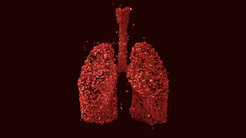Bacterial colonisation of the lung also depends on the host genome
Researchers at Kiel University, the Research Center Borstel and the Max-Planck-Institute Plön have used modern methods of analysis to implicate the role of known disease genes in lung microbiota composition.
Joint press release by Kiel University (CAU), the Research Center Borstel, Leibniz Lung Center (FZB) and the Max-Planck-Institute for Evolutionary Biology Plön

The lung is by no means a sterile place, as was assumed for a long time. In fact, it actually harbours a diverse microbial ecosystem. We know from previous studies that changes in the lung microbiome are associated with diseases such as cystic fibrosis, asthma or chronic obstructive pulmonary disease (COPD). Environmental factors such as smoking, nutrition in infancy or the use of antibiotics are important factors for the composition and stability of the microbial community in the lung. We still do not fully understand how host genetics influence the lung microbiome. This is mainly because it is difficult to obtain lung samples, and the fact that the microorganisms are found in relatively small numbers. A research team from the Leibniz ScienceCampus "EvoLUNG" led by Professor John Baines has therefore carried out detailed studies of the lung microbiome in a mouse model. "We have studied the links between individual bacterial species in the lung and markers in the host genome to identify genes that influence lung bacteria and may play a role in susceptibility to disease," explains Baines, who heads the Evolutionary Medicine working group at Kiel University (CAU) and at the Max Planck Institute for Evolutionary Biology in Plön. A total of seven genomic regions for eight bacterial traits were found. "We were able to identify several promising genes related to immune and inflammatory responses, lung functioning and disease susceptibility," says Baines. The paper, recently published in the journal Animal Microbiome, was also supported by the Cluster of Excellence "Precision Medicine in Chronic Inflammation" (PMI) and the Collaborative Research Centre "Origin and Function of Metaorganisms" (CRC 1182).
Number of Lactobacilli varies depending on Interleukin 10 gene
In the study, state-of-the-art molecular biological methods of analysis were used to quantify the bacterial species present in the lungs of the investigated mice, even with a low biomass. "Our study provides the first evidence for a role of host genetic variation contributing to variation in the lung microbiota," explains co-author Dr Meriem Belheouane from the Research Center Borstel, Leibniz Lung Center (FZB). The amount of Lactobacillus in the lungs was shown to be strongly associated with a specific region that contains the gene coding for the anti-inflammatory cytokine Interleukin 10. This finding was confirmed in animals in which the gene for Interleukin 10 (IL-10) was deactivated. Belheouane says: "IL-10 knockout mice had fewer Lactobacilli than the non-knockout animals." Host genetic variations were also found for the number of Pelomonas, another common bacterial species in the lungs. The functional significance of these bacterial species could potentially be used for future preventive or therapeutic purposes.
About EvoLUNG
Despite major advances in diagnostics and treatment, lung diseases are on the rise worldwide and are among the most common causes of death. The aim of the Leibniz ScienceCampus for Evolutionary Medicine of the Lung (EvoLUNG) is to better understand the origin and development of chronic lung diseases such as tuberculosis or asthma. To this end, the scientists are working in interdisciplinary teams to investigate the spread and origin of multi-resistant pathogens in the lungs. On the other hand, they are researching the evolution of human gene variants that favour lung diseases, as well as the complex interaction of disease genes, microorganisms, pathogens and environmental factors in the development of lung diseases. In the long term, EvoLUNG aims to develop better diagnostics and improve therapies for diseases such as asthma, tuberculosis, cystic fibrosis or chronic bronchitis. A special focus is on preventing the development of resistance in the course of tuberculosis or cystic fibrosis as well as on a better understanding of the role of the body's own microbiota in the development of asthma. EvoLUNG is led by Professor Stefan Niemann from the Research Center Borstel (FZB) and, in addition to the FZB, also includes Kiel University (CAU) and the Max Planck Institute for Evolutionary Biology in Plön (MPI-EB).
About Kiel Life Science (KLS)
The interdisciplinary centre for applied life sciences – Kiel Life Science (KLS) – links research at the CAU from the fields of agricultural and nutritional sciences, the natural sciences and medicine. It forms one of four priority research areas at Kiel University, and is aimed at achieving a better understanding of the cellular and molecular processes with which organisms respond to environmental influences. The research is focussed on issues such as how agricultural crop plants adapt to specific growth conditions, or how illnesses can arise through the interaction of genes, individual lifestyle and environmental factors. Health is always viewed holistically in the context of evolution. Under the priority research area’s name, there are currently around 80 scientists from 40 institutes and six faculties from Kiel University working collaboratively as full members.
